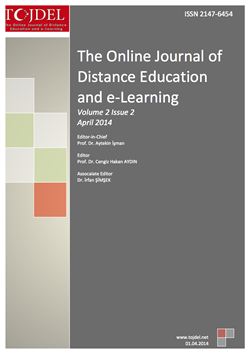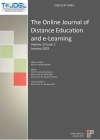TOJDEL - Volume 2 - Issue 2 - April 2014
 Academic Libraries In The Digital Age: Best Practices For Modernizing The Library
Academic Libraries In The Digital Age: Best Practices For Modernizing The Library Jennifer Wright
Abstract: This paper addresses the practical changes to the library field that continue to take place as technology advances. These changes include changes to physical space, collection development, and librarian workflows. It will also include best practices to modernize the academic library to best complement a technologically driven university.
 Information T echnology Enhances Students’ Academic Performance: A Case Of University Of Ilorin
Information T echnology Enhances Students’ Academic Performance: A Case Of University Of Ilorin AbdulRahman Ahlan, Balogun Naeem Atanda, Yahaya Isah Shehu
Abstract: This study aims to investigate the impact of Computer Based Test in enhancing students’ academic performance, its acceptance and how it can be improved upon. In addition, the study also tries to access the computer ownership and its impact to students’ performance in Computer Based Testing. The study use questionnaire-based survey to gather responses from the students in order to understand if technology usage has impact on student’s academic performance, and their acceptance of technology to conduct examination. Findings of this study shows significant relationship between computer ownership and the use of technology for examination, and technology with students’ academic performance. The findings should assist the learning institution to improve the implementation of e-learning in order for the students’ to have best results and facilitate its technical know-how so that it will gain acceptance by all the students especially the at-risk students and the physically challenged. The research provides useful information for learning institution based on the students’ academic performance due to the recent development and implementation of Computer Based T esting.
 Quality in private higher education system; New challenges regarding student’s satisfaction
Quality in private higher education system; New challenges regarding student’s satisfaction Skender Bruçaj
Abstract: The demands for quality standards in higher education are increasing due to competition as a result of massification and internalization process of universities. The expectation for better performance in quality of teaching, academic research and other related educational activities are forcing universities leadership management to rethink their strategies. Approaching the philosophy of Total Quality Management (TQM) can lead leadership management of universities to desirable results regarding continues quality improvement in higher education. In the centre of TQM philosophy in higher education is student satisfaction. Understanding and satisfying student’s needs are the cause of existence for all higher education institutions. Therefore reaching quality standards in higher education is significant regard meeting the expectations of students, especially for newly established private higher education institutions. The main purpose of this study is to examine the role of student satisfaction regarding quality assurance in Albanian private higher education institutions.
 Reliable Measures of Concept Map Examinations
Reliable Measures of Concept Map Examinations Darrell L. Butler
Abstract: The emerging capabilities of online educational materials are creating new challenges for faculty who use examinations to evaluate conceptual knowledge. This report provides an exploration of whether non- traditional concept map exams can not only mitigate some of the challenges, but can encourage students to organize conceptual knowledge, can be created quickly, scored reliably, and have many other desirable characteristics. An analysis of existing concept map scoring approaches reveals some useful variables and some variables with poor reliability and validity. Some new variables with excellent reliability and face validity are suggested. A software testing system called EasyMap was created for this exploration and is available for free to others interested in researching concept map exams.
 Sharing is Caring. Why do We have Barriers in Knowledge Sharing?
Sharing is Caring. Why do We have Barriers in Knowledge Sharing? Marinah Awang , Omar Abdull Kareem , Ramlee Ismai
Abstract: Knowledge can be seen as an intangible asset which is unique, path dependent, causally ambiguous and hard to imitate or substitute. It grows and multiplies when it is shared, and these characteristics make knowledge a potential source of competitive advantage and, consequently, the target of managerial attention. However, barriers in knowledge sharing are commonly occurring issues in any knowledge management initiatives organization. Often they are manifested in different ways either from internal or external factors or from human to physical aspect. The purpose of this study is to explore what deters individuals from sharing and why it occurs in the light of teaching profession in the context of schools. A qualitative method is used to seek for the answers involving in depth interviews to twenty secondary school teachers. The analysis provides some evidence for barriers to knowledge sharing which were not restricted to technology but also included the social and physical environment of schools. Essentially it may enhance understanding of the complexities of knowledge sharing behaviour .
 Using Web-Blended Learning In Ukraine T o Facilitate Engagement And Globalize Horizons: A Pilot Study
Using Web-Blended Learning In Ukraine T o Facilitate Engagement And Globalize Horizons: A Pilot Study David V. Powell, Svitlana Kuzmina , Yevheniy Kuzmin , Tamara Yamchynska , Oleksandr Shestopalyuk
Abstract: After two decades, Ukraine still struggles to establish consistent expectations and a research base of classroom applications to modernize distance education technology and pedagogies aligned with international standards. This report analyzes student feedback from a web-blended pilot class in the foreign languages teacher education program at Vinnytsia State Pedagogical University to identify factors that contributed toward student engagement and learning. The class used Skype technology to present guest lecture/discussion sessions hosted by international speakers. A free Google Education Application was used to provide access to instructional materials and conduct biweekly asynchronous forums moderated by local and guest faculty. Student feedback indicated increased engagement and interest in course content through ease of access, flexibility in scheduling, increased opportunity for self-expression and development of ideas, and exposure to varied perspectives. Students also noted issues with reliability of internet service, message load and time management, and made recommendations for improvement.


